Related Research Articles
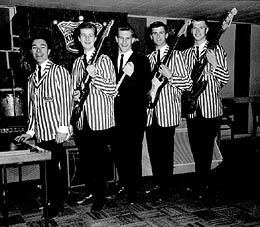
The Kingsmen are a 1960s American rock band from Portland, Oregon. They are best known for their 1963 recording of R&B singer Richard Berry's "Louie Louie", which held the No. 2 spot on the Billboard charts for six weeks and has become an enduring classic.

Paul Revere & the Raiders were an American rock band formed in Boise, Idaho, in 1958. They saw considerable U.S. mainstream success in the second half of the 1960s and early 1970s. The band was known for including Revolutionary War-style clothes in their attire.
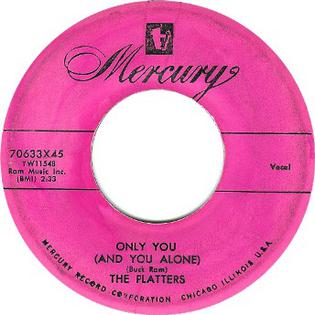
"Only You (And You Alone)" (often shortened to "Only You") is a pop song composed by Buck Ram. It was originally recorded by The Platters with lead vocals by Tony Williams in 1955.
"If This World Were Mine" is a 1967 song by soul music duo Marvin Gaye and Tammi Terrell from their album United. Written solely by Gaye, it was one of the few songs they recorded without Ashford & Simpson writing or producing. When it was released as a single in November 1967 as the B-side to the duo's "If I Could Build My Whole World Around You", it hit the Billboard pop singles chart, peaking at number sixty-eight, and peaked at number twenty-seven on the Billboard R&B singles chart. Gaye would later put the song into his set list during his last tours in the early-1980s as he performed a medley of his hits with Terrell. The song was covered a year later by Joe Bataan on the 1968 Fania Allstars LP Live at the Red Garter, Vol. 2, and in 1969 by Ambrose Slade (pre-Slade) on their album Beginnings.

"Wonderful Tonight" is a ballad written by Eric Clapton. It was included on Clapton's 1977 album Slowhand. Clapton wrote the song about Pattie Boyd. The female vocal harmonies on the song are provided by Marcella Detroit and Yvonne Elliman.

"Put Your Head on My Shoulder" is a song written by Canadian-born singer-songwriter Paul Anka. Anka's version was recorded in August 1958 at Bell Sound Studios in New York City, three weeks before he recorded his no. 1 hit "Lonely Boy", and was released as a single on August 17, 1959, by ABC-Paramount as catalog number 4510040. It was arranged and conducted by Don Costa. The B-side was "Don't Ever Leave Me". "Put Your Head on My Shoulder" became very successful, reaching No. 2 on the Billboard Hot 100. It was his third top five hit of 1959. In Canada the song reached No. 4 on the CHUM Charts.

"Runaway" is a number-one Billboard Hot 100 song made famous by Del Shannon in 1961. It was written by Shannon and keyboardist Max Crook, and became a major international hit. It topped the Billboard charts for four consecutive weeks, and Billboard ranked it as the No. 5 song for 1961. It was No. 472 on the 2010 version of Rolling Stone's list of the 500 Greatest Songs of All Time and No. 466 on the 2004 version.
"Come Softly to Me" is a popular song recorded by The Fleetwoods, composed of Gretchen Christopher, Barbara Ellis, and Gary Troxel, who also wrote it. The original title was "Come Softly", but was changed en route to its becoming a hit. Bob Reisdorf, the owner of Dolphin Records, which in 1960 changed to Dolton Records, was responsible for the title change. He thought that "Come Softly" might be too obvious and considered risqué, so he had it changed to "Come Softly to Me." The title phrase never appears in the song's lyrics.
"Dream Lover" is a song written by American musician Bobby Darin. Darin recorded his composition on March 5, 1959 and released it as a single the following month. It was produced by Ahmet Ertegun and Jerry Wexler and engineered by Tom Dowd.
"Mountain of Love" is a song written by Harold Dorman. Dorman released his version as a single in 1960. It was originally recorded in late 1959 at the Royal Recording Studios in Memphis before the backing vocals were overdubbed. It performed well, spending 19 weeks on the Billboard Hot 100 chart, peaking at No. 21 in May 1960, while reaching No. 7 on the Billboard Hot R&B Sides chart, and No. 25 on Canada's "CHUM Hit Parade". The song was his only top forty hit on the Billboard Hot 100 and was the highest-charting single of his career.
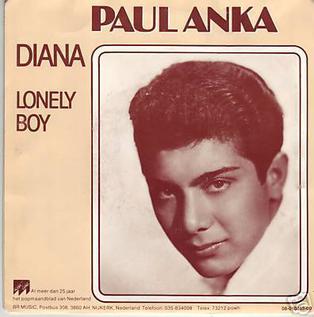
"Diana" is a song written and first performed by Paul Anka, who recorded it in May 1957 at Don Costa’s studio in New York City. Anka stated in his autobiography that the song was inspired by a girl named Diana Ayoub, whom he had met at his church and community events, and had developed a crush on. Session musicians on the record included George Barnes playing lead guitar, Bucky Pizzarelli playing the "Calypso" riff on guitar, Irving Wexler on piano, Jerry Bruno on bass, and Panama Francis on drums. The song was recorded in May 1957 at RCA Studios in New York. Backup singers included Artie Ripp.
"When You Walk in the Room" is a song written and recorded by Jackie DeShannon. It was initially released as a single on November 23, 1963, as the B-side to "Till You Say You'll Be Mine". It was re-released as an A-side in September 1964, and later included on the album Breakin' It Up on the Beatles Tour. The single charted on the US Billboard Hot 100, peaking at number 99.
Paul Evans is an American rock and roll singer and songwriter, who was most prominent in the 1950s and 1960s. As a performer, he had hits with the songs "Seven Little Girls Sitting in the Backseat", reaching No. 9 on the Billboard Hot 100 in 1959), "Midnight Special" and "Happy-Go-Lucky Me".
"Running Bear" is a teenage tragedy song written by Jiles Perry Richardson and sung most famously by Johnny Preston in 1959. The 1959 recording featured background vocals by George Jones and the session's producer Bill Hall, who provided the "Indian chanting" of "uga-uga" during the three verses, as well as the "Indian war cries" at the start and end of the record. It was No. 1 for three weeks in January 1960 on the Billboard Hot 100 in the United States and the same on Canada's CHUM Charts. The song also reached No. 1 in the UK Singles Chart and New Zealand in 1960. Coincidentally, "Running Bear" was immediately preceded in the Hot 100 No. 1 position by Marty Robbins' "El Paso", and immediately followed by Mark Dinning's "Teen Angel", both of which feature a death of, or affecting, the protagonist. Billboard ranked "Running Bear" as the No. 4 song of 1960. The tenor saxophone was played by Link Davis.
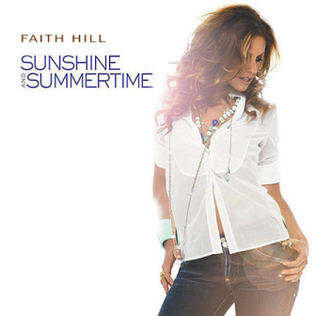
"Sunshine and Summertime" is a song written by John Rich, Kylie Sackley, and Rodney Clawson and recorded by American country music singer Faith Hill. It was released in June 2006 as the fourth single from Hill’s 2005 album Fireflies. The song reached No. 7 on the US Billboard Hot Country Songs chart.
"He'll Have to Go" is an American country and pop hit recorded on October 15, 1959, by Jim Reeves. The song, released in the fall of 1959, went on to become a hit in both genres early in 1960.

"My Special Angel" is a popular song by Jimmy Duncan, published in 1957.
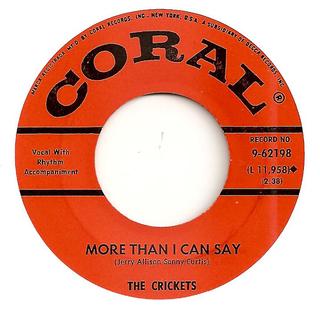
"More Than I Can Say" is a song written by Sonny Curtis and Jerry Allison, both former members of Buddy Holly's band the Crickets. They recorded it in 1959 soon after Holly's death and released it in 1960. Their original version hit No. 42 on British Record Retailer Chart in 1960. It has been notably performed by singers Bobby Vee and Leo Sayer.
Richard Adam Ziegler, known professionally as Ritchie Adams, was an American singer and songwriter.
"You Were Mine" is a song written and recorded in 1959 by Paul Giacalone and performed by American doo-wop group The Fireflies.
References
- 1 2 3 4 "Paul N. Giacalone". paulngiacalone.com. Retrieved 2015-09-26.
- ↑ Hot 100 - You Were Mine The Fireflies, Billboard.com. Retrieved February 8, 2018.
- ↑ "The Billboard HOT 100", Billboard , October 26, 1959. p. 40. Accessed September 26, 2015
- ↑ "CHUM Hit Parade", CHUM , Week of November 09, 1959
- ↑ Hamilton, Andrew. "Fireflies - Music Biography, Credits and Discography". AllMusic. Retrieved 2013-07-03.
- ↑ "Fireflies - Awards". AllMusic. Retrieved 2013-07-03.
- ↑ "The Billboard HOT 100", Billboard , February 1, 1960. p. 60. Accessed September 26, 2015
- ↑ "Songs written by Ritchie Adams", MusicVF.com. Accessed September 27, 2015
- ↑ "Oldies Music News", Retrieved March 12, 2017.
- ↑ Doc Rock. "The Dead Rock Stars Club 2013 January to June". Thedeadrockstarsclub.com. Retrieved 2013-07-03.
- ↑ The passing of Fireflies’ lead Ritchie Adams (Ziegler) accessdate December 4, 2017